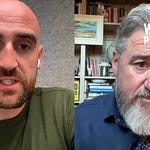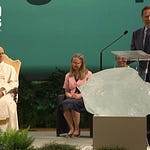If there’s one thing we’ve learned from COP29 in Baku (so far), it’s this: international climate negotiations are less kumbaya and more knives-out Hobbesian diplomacy wrapped with a smiley face. And in the face of rising geopolitical tensions, the stakes couldn’t be higher—or more surreal.
Consider. Petrostate “oil-is-a-gift-from-God” yahoos are hosting1; small island states are given a devil’s bargain of signing their own death warrant vs. going-along-to-get-along to hope next time will be different; the US is officially a political basket case; Europe’s leading battery manufacturer declares bankruptcy; and China is now unquestionably in charge of the global energy transition.
For this episode of Wicked Problems – Climate Tech Conversations, I sat down with Jeremy Wallace, A. Doak Barnett Professor of China Studies at Johns Hopkins School of Advanced International Studies (and breakout BlueSky star), to cut through the noise. Wallace is a rare breed: a political scientist who’s studied both China’s domestic transformations and its role as the fulcrum of the global energy transition. With a touch of humour and a clear-eyed perspective, he helps us navigate the murky waters of climate politics in the shadow of the Trumpocalypse 2.0.
Highlights From the Episode:
"China: Climate Hero or Villain?"
Wallace unpacks China’s paradoxical role as both the largest carbon emitter and the kingpin of renewable energy. Spoiler: the narrative isn’t as simple as “state-driven genius” or “rampant capitalism.” Instead, it’s a messy story of entrepreneurial risk-taking, local rivalries, and accidental successes."The U.S.: Basket Case or Building Hope?"
From Texas wind farms to federal policy whiplash, the U.S. embodies climate contradictions. Wallace argues that America’s Achilles heel is its inability to build—except when it comes to oil and gas. The irony? The free market might still hold the key to progress."Europe: Demanding a Handout?"
Amid whispers of European negotiators asking China to share its EV and battery tech, we discuss whether this reflects global cooperation—or just desperation. As Wallace puts it, “Turnabout is fair play.”
Why This Episode Matters:
This week’s COP29 negotiations might feel like déjà vu: vague promises, gridlocked finance talks, and incremental progress at best. But Wallace offers a provocative take: the real story isn’t in the plenary halls. It’s in the bilateral deals, the sector-specific alliances, and the surprising resilience of market forces driving the transition forward—despite political chaos.
He challenges us to rethink our assumptions about competition. Should the US, EU, and China be playing “big boy rules,” each out for themselves? Or could smarter, sector-specific collaboration unlock faster, more equitable solutions?
Final Takeaway:
For all its flaws, COP29 still matters—if only because it keeps the global conversation going. Wallace leaves us with a stark reminder: the economics of the energy transition are real, but the politics can either accelerate or derail progress. The question isn’t whether we’ll adapt, but whether we’ll do it in time.
So, if you’re tired of oversimplified narratives, tune in to this episode. It’s a reality check, a shot of dark humor, and maybe even a glimmer of hope—all set to the perfect irony-laden outro track (spoiler: today’s is Arcade Fire’s Everything Now).
Maybe just move future COPs to Houston and be done with the pretence.












